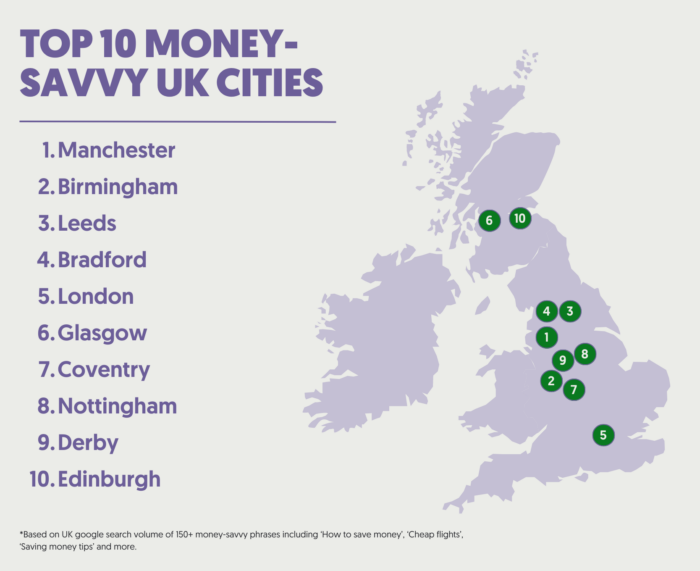The UK’s Money-Savviest Cities (2024)

With rising inflation and the cost-of-living issue affecting bills, rent, and the ability to stay out of debt, many people are taking to the internet to see how they can make their money go further. So which UK cities are going the extra mile to save their pennies the most?
To explore this, MoneyNerd has conducted a study analysing which UK cities are researching ways to save their money, by investigating how often the 25 most populous UK cities googled 150+ different phrases to do with money-saving e.g. ‘Cheap holidays’, ‘Cheap flight’, ‘Money saving tips’.
Each city was then awarded a total Money-Savvy score per every 1,000 residents – and the results may surprise you.
Take a look below to see which UK city is the savviest with their finances:
Manchester Is the Money-Savviest City in 2023, Followed by Birmingham and Leeds

| Rank | City | Total Money-Savvy Monthly Search Volume | Total Money-Savvy Monthly Search Volume per 1,000 People in the City | Overall Money-Savvy Score |
| 1 | Manchester | 122,100 | 309 | 10.0 |
| 2 | Birmingham | 201,300 | 205 | 6.7 |
| 3 | Leeds | 80,250 | 176 | 5.8 |
| 4 | Bradford | 45,150 | 151 | 5.0 |
| 5 | London | 1,196,250 | 133 | 4.4 |
| 6 | Glasgow | 76,200 | 129 | 4.3 |
| 7 | Coventry | 45,150 | 126 | 4.2 |
| 8 | Nottingham | 40,200 | 125 | 4.1 |
| 9 | Derby | 33,000 | 122 | 4.1 |
| 10 | Edinburgh | 56,400 | 121 | 4.0 |
Table 1 – Top 10 Money-Savviest Cities in the UK, 2023
Manchester is officially the most money-conscious UK city of 2023, with 122,100 total monthly searches for money-savvy keywords (309 monthly searches per 1,000 people living in the city). This works out as 1,465,200 money-saving searches a year!
The large search volume could be related to how many Millennials and people under 25 are moving to Greater Manchester (the under 25s population in the area is larger than the England average by 2%). Studies show that Generation Z is the most money-savvy generation, so these money-saving attitudes could be filtering through to their Google searches.
Birmingham, Leeds, and Bradford follow in the top most financially conscious UK cities. Monthly, Birmingham completes 201,300 searches for money-saving phrases (205 searches for every 1,000 people in the city). Interestingly, Leeds, Bradford, and Manchester are all found in the north of the UK, while Birmingham (the second largest city in the UK) is in the West Midlands.
It may be a surprise that London placed fifth in this study, as previous research has shown that prices associated with all living costs are 7% higher in the capital than the UK average. However, for every 1,000 people in the metropolitan area, there are only 133 searches on ways to save money (1,196,250 monthly for the whole of London).
Glasgow takes the sixth spot, with 129 searches for ways to save money per 1,000 residents. Coventry, Nottingham, Derby, and Edinburgh round out the top 10 most money-savvy cities, all of which have over 120 searches per 1,000 people in each city.
The Most Googled Money-Saving Phrases in the UK in 2023

Everybody wants to make the most out of their money, especially when financial times are hard, and learning from others how to do so is an efficient way of doing it. With this invested interest in discovering others’ spending and saving habits, MoneyNerd analysed the search history of the most popular phrases and keywords associated with saving money that were googled over the last 12 months.
Here are the top 10 most searched money-saving phrases in the UK:
| Rank | Money-Savvy Keywords | UK Monthly Search Volume |
|---|---|---|
| 1 | Cheap Flights | 377,000 |
| 2 | Cheap Holidays | 147,000 |
| 3 | Cost of Living Payment | 109,000 |
| 4 | Cheap Train Tickets | 105,000 |
| 5 | Cheap Car Insurance | 86,000 |
| 6 | Cheap Hotels Near Me | 41,000 |
| 7 | Cheap Phone Sex | 29,000 |
| 8 | Cheap All Inclusive Holidays | 29,000 |
| 9 | Cheap Drinks | 22,000 |
| 10 | Ryanair Cheap Flights | 22,000 |
Table 2 – Top 10 Most Commonly Searched Money-Saving Phrases/Keywords in the UK, 2023
‘Cheap Flights’ takes the number one spot in this study, with 377,000 searches monthly across the UK. This is followed by ‘Cheap Holidays’, which has 147,000 UK monthly searches. ‘Cost of Living Payment’ (109,000 search volume) came third in keyword frequency, with the current financial state of the UK visibly impacting these cities’ approaches to saving and managing money.
In fourth place is ‘Cheap Train Tickets’ (105,000 search volume) and in fifth place is ‘Cheap Car Insurance’ (86,000 search volume), which comes as no surprise with sites like Confused.com discovering that car insurance costs have gone up by 19% over the last 12 months.
Travel-saving terms make up six out of the top ten most googled ways to save on expenses in the UK. Studies have shown that travel has the potential to make people happier than other spending habits, so it seems as though consumers want to save as much as possible on holidays to make the most of their money.
5 Tips for Saving Money on Your Next Holiday Booking

With this huge push towards money-saving ideas for travel, MoneyNerd spoke to James Chapman at Travel Counsellors and Reena Kaur at Catch A Gem to reveal tips that can help you save money when organising your next holiday.
- Book your holiday accommodation years in advance if you can
Arranging your holiday far in advance can save you a huge amount of money, as you may be given access to early sales. James Chapman, Consultant at Travel Counsellors, has said: ‘I have a honeymoon booked for customers in 2025, and I have recently booked a trip for customers to Mexico in March 2024 for Easter. The hotel had a 53% early booking offer, which saved over £2500 for a week’s accommodation.
We haven’t booked the flights yet, as they only come out 11 months in advance, but when they do we will be waiting to book the cheapest class on seats and to get the cheapest price. It’s the early bookers who make the biggest savings compared to people who wait until the last minute.’
- Use a travel card when getting your holiday currency
Exchanging currency may actually be cheaper if you get a travel card and use local cash machines. James Chapman comments: ‘I always travel with a specialist travel card that allows for free withdrawals abroad, which then if you select local currency at the cash machines, uses the current exchange rates and avoids any additional charges.
There are now lots of accounts with cards like this on the market, so if you haven’t got one, I would recommend researching which would be the best one for you and start saving your money going forward.’
- Book your flights as early as possible
Chapman says: ‘The absolute best time to book flights is as early as possible. The earlier the better, especially if it’s a long haul. Flight tickets are sold off in sections called classes and each time enough seats are sold in a class, it moves on to the next class which increases the price.
The biggest impact recently on flights has been exchange rates and taxes. It’s not very exciting, but in my experience, the changes in prices don’t have much to do with the day of the week, it’s much more to do with the economy at the time you look.’
- Use flight-comparison sites
Don’t be afraid to scout around for the best, and cheapest, deals for your flight. Reena Kaur, Travel Deal Curator at Catch A Gem, has said: ‘Always use different comparison sites when searching for flights. The top ones include Google Flights, KIWI, and Skyscanner. These sites all have exclusive prices that they are able to offer searchers and most of the time they are the best places to go first when looking for an offer than going direct.’
- Book directly with the hotel, not through holiday-booking sites
Reena Kaur comments: ‘When you see a hotel on a site like Booking.com or Trivago (etc.), a good trick is to call the hotel directly and haggle the reservation price. Let them know that you’ve seen it for (X) amount on a site and ask if they’d be able to do anything on the price. This does tend to work as they save on booking fees and would prefer for you to go direct.’
5 Tips for Building Financial Confidence

Learning how to manage finances, especially during a time of economic instability, can be a difficult task. Scott Nelson, founder and CEO of MoneyNerd, has suggested a number of ways that you can become more confident with money matters, and take back control of your finances.
- Check if your bank offers cashback schemes on purchases through debit cards.
Many banks have schemes that encourage you to save money on your spending, from bills to everyday purchases. Some of these include:
- Santander Edge lets you earn 1% cashback on all household bill spends and supermarket/travel spends (up to £10 a month for each), with a £3 fee a month to have access to these deals. This can save you up to £17 a month.
- Nationwide allows you to get 5% cash back on purchases made at supermarkets and other select retailers, up to £10 a month.
- Lloyds Bank offers up to 15% cash back on purchases made at specific retailers (e.g. Ralph Lauren, Vistaprint, Apex Hotels) with its ‘Everyday Offers’ scheme when you shop with a debit or credit card.
- Keep an eye out for credit card perks.
If you’re searching for banks to get a new credit card, keep an eye out for any perks the bank can offer to entice you to sign with them. Some of these perks may include money back at select retailers, store points that can be turned into vouchers, and money off travel.
- Clear as much debt as possible before making any new (and large) payments.
Interest on debt can rack up very quickly, and having multiple credit cards with a number of payments that are sitting there waiting to be paid can lead to a considerable amount more money being owed.
- Don’t be afraid to switch contracts to find a better deal.
If possible, switch any existing contracts with your broadband provider, phone provider etc. to find a new and better deal that can offer you more savings. Many providers will offer sales and deals for new customers, so make the most out of these offers where possible.
- Spend some time creating a monthly budget.
Make a budget that includes allocations for food spending, rent and bills, and anything entertainment-based e.g. days out. There are plenty of apps that can help with this, including ‘Goodbudget’ and ‘Fudget’. Having the exact budgeting costs laid out for you at the beginning of the month will let you know exactly what you can and can’t spend, which will help you make more informed decisions moving forward.
Methodology:
To calculate the most money-savvy cities in the UK, MoneyNerd analysed 25 of the UK’s most populous cities and looked into how often residents in these cities google money-savvy keywords such as ‘How to save money’, ‘Cheap flights’, ‘Cheap Holidays’, ‘Saving money tips’ and more.
We also used Ahrefs keyword planner and Google ad words to reveal the monthly search volumes in these UK cities.